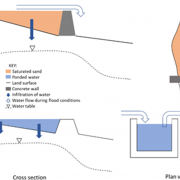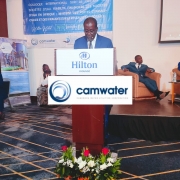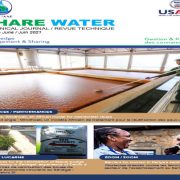VALORISATION DES RESSOURCES EN EAU EN GUINEE EN VU D’UN DEVELOPPEMENT ECONOMIQUE, SOCIAL ET DURABLE
RESUME
La Guinée a un potentiel hydrologique riche et diversifié.
Plusieurs cours d’eau de la sous-région y prennent leur source.
Le réseau hydrographique comprend 1161 cours d’eau, regroupés en 23 bassins versants.
Le pays compte 14 fleuves internationaux y compris le fleuve Niger dont le bassin est partagé par neuf pays de la sous-région.
Malheureusement les ressources en eau sont aujourd’hui menacées par des actions anthropiques de diverses origines (agriculture
extensive, exploitation minière à ciel ouvert, pêche illicite, feux de brousse, confection de briques cuites le long des cours d’eau, etc.) et par les effets néfastes du changement climatique.
Aussi, les aspects institutionnels et juridiques sont peu favorables à une gestion durable des ressources en eau.
L’impact du manque d’eau se fera sentir sur toutes les activités socio-économiques, particulièrement sur le secteur de l’agriculture, principal utilisateur de l’eau dans le pays.
Les sècheresses et les inondations récurrentes ont entraîné une baisse des disponibilités alimentaires en céréales.
Le pays est doté d’une grande potentialité hydroélectrique (6000 MW), malheureusement, seuls 6% sont mis en valeur.
Pour honorer ses engagements internationaux dans le cadre de la réduction de ses émissions du gaz à effet de serre, le pays compte d’ici 2030, quintupler sa production en hydroélectricité qui constitue une énergie propre.
Le secteur de l’approvisionnement en eau potable reste confronté à la faible capacité de production et de traitement de l’eau.
La gestion des ressources en eau dans le pays repose sur des plans généraux d’Aménagements Hydrauliques de 1978 et 1982.
Toutefois, le pays cherche à se doter d’une politique nationale de gestion intégrée des ressources en eau (GIRE) et l’élaboration d’un plan d’action privilégiant la prise en compte de la coopération en matière de bassins versants partagés.
Mots clés : potentiel, hydrologie, réseau, hydrographie, fleuve, Niger, bassin, ressources, eau, anthropiques, changement climatique,
gestion, durable, ressources, potentialité, hydroélectricité, socio économie.
SUMMARY
The Republic of Guinea has a rich and diversified hydrological potential. Several rivers in the sub Valorisation des ressources en eau en Guinée en vue d’un développement économique et social durable 107 region have their source.
The hydrographic network comprises 1161 rivers, grouped into 23 watersheds.
The country has 14 international rivers, including the Niger River, whose basin is shared by nine countries.
Unfortunately, water resources are now threatened by anthropogenic activities of diverse origins (extensive agriculture, open-pit mining,
illegal fishing, bush fires, making cooked bricks along streams, etc.) and the adverse effects of climate change.
Moreover, the institutional and legal aspects are not conducive to the sustainable management of water resources.
The impact of water shortage will be felt on all socio-economic activities.
The agriculture sector is the main user of water in the country, droughts and recurrent floods have led to a decline in cereal
food supplies.
The country has a high hydroelectric potential (6,000 MW), unfortunately, only 6% of its potential is used.
In order to meet its international commitments to reduce its greenhouse gas emissions, by 2030, the country will have to
quintuple its hydroelectric production, which constitutes clean energy.
The drinking water supply sector remains confronted with the low capacity of production and treatment of water.
The management of water resources in the country is based on general plans for water development elaborated between 1978 and 1982.
However, the country seeks to have a national policy for integrated water resources management and development of an action plan focusing on taking into account cooperation on shared watersheds.
Keywords: Potential, hydrology, network, hydrography, river, Niger, watershed, resources, water, anthropogenic, climate change,
management, Sustainable, resources, potentiality, hydropower, socio-economic.

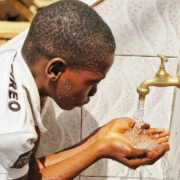 AAEA
AAEA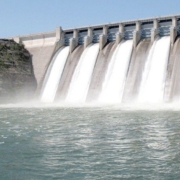 AAEA
AAEA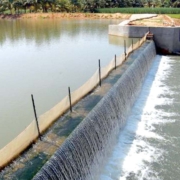 AFWASA
AFWASA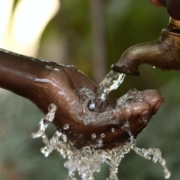 AAEA
AAEA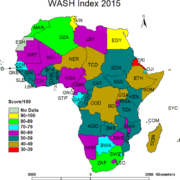 AFWASA
AFWASA